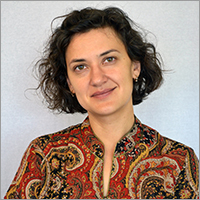Vortrag
 |
Ass. Prof. Dr. Olesya Kisselev (University of Texas at San Antonio, USA) A talk for the ↗︎ Virtual Laboratory August 13, 2020, 16:00–17:30 Access to the ↗︎ virtual room without registration |
Abstract
Heritage language speakers have been recognized as a special group of language learners, whose knowledge of and experiences with the language, as well as their motivations for (re)learning their home language, differ drastically from that of an average learner of a second language. Understanding the specifics of cognitive and identity-related factors in heritage language acquisition, as Kisselev, Dubinina and Polinsky (2020) argue, should inform pedagogical approaches in the heritage classroom. Drawing on the results of current linguistic research and on insights from the currently available pedagogically oriented classroom and laboratory-based research on heritage language learners, this talk will explore the cognitive processes that shape the nature of heritage language knowledge and discuss an approach to heritage language pedagogy based on these insights.
Bio
Dr. Olesya Kisselev is an assistant professor in the Department of Bicultural-Bilingual Studies, College of Education and Human Development at the University of Texas at San Antonio. She has been involved in the field of heritage language for many years, both as a researcher and as a language practitioner. She completed her Ph.D. (2018) at Pennsylvania State University in the Department of Applied Linguistics. Her dissertation Word Order and Information Structure in the Writing of Heritage and Second Language Learners of Russian won the prestigious Dissertation Award Grant from the National Federation of Modern Language Teachers Association (NFMLTA). Dr. Kisselev’s primary research interests are a direct result of her experience as a language educator and focus on the development of second and heritage languages and second language/heritage language pedagogy. Her contributions to the field also include the textbook Родная Речь: An Introductory Course for Heritage Learners of Russian, as well as an educational project ↗︎ RUSSIAN for HERITAGE LEARNERS (Middlebury's Davis School of Russian).
Recommended literature
Bayram, F., Prada, J., y Cabo, D. P., & Rothman, J. (2018). Why should formal linguistic approaches to heritage language acquisition be linked to heritage language pedagogies? In P. Trifonas & T. Aravossitas (eds.), Handbook of research and practice in heritage language education (pp. 187–206). Berlin: Springer.
Bowles, M.A., & Torres, J. (forthcoming). Instructed heritage language acquisition. In S. Montrul, & M. Polinsky (eds.), The Cambridge handbook of heritage languages and linguistics. Cambridge: Cambridge University Press.
Carreira, M., & Kagan, O. (2018). Heritage language education: A proposal for the next 50 years. Foreign Language Annals, 51(1), 152–168. ↗︎ https://doi.org/10.1111/flan.12331
Kisselev, O., Dubinina, I., & Polinsky, M. (2020). Form-Focused Instruction in The Heritage Language Classroom: Toward Research-Informed Heritage Language Pedagogy. In Frontiers in Education (Vol. 5, p. 53). Frontiers.
Kupisch, T., & Rothman, J. (2018). Terminology matters! Why difference is not incompleteness and how early child bilinguals are heritage speakers. International Journal of Bilingualism, 22, 564–582. ↗︎ https://doi.org/10.1177/1367006916654355
|
The project aims to popularize and promote cognitive and neurocognitive sciences data The Virtual Laboratory (a MOOC-like resource) constitutes an open collection The recorded videoconferences will be available at the webspace ↗︎ Detailed project description If you are interested in presenting a talk within the Virtual Laboratory, |
|



